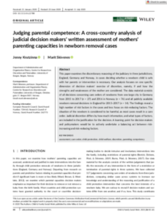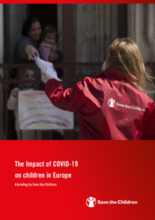Displaying 31 - 40 of 111
In this short report, the author provides insight into the situation of domestic violence refuges in Norway during the spring of 2020 and their concern for their youngest clients.
This paper examines the discretionary reasoning of the judiciary in three jurisdictions, England, Germany and Norway, in cases deciding whether a newborn child is safe with her parents or intervention is necessary.
The purpose of this study was to investigate whether Norwegian adolescents in contact with child welfare services (CWS) are at higher risk for substance-related problems (SRP) compared with the general adolescent population, and to what extent those in foster care (FC) differ from those receiving in-home services (IHS).
The purpose of this study was to investigate whether Norwegian adolescents in contact with child welfare services (CWS) are at higher risk for substance-related problems (SRP) compared with the general adolescent population, and to what extent those in foster care (FC) differ from those receiving in-home services (IHS).
The aim of the present study was to investigate cognitive functioning at age 8 years among 39 foster children (FC) compared to 36 children in a non-foster comparison group (NFC).
This paper addresses the conceptualization of ‘outcomes’ for care experienced people through an in-depth longitudinal study of 75 young adults in Denmark, England and Norway.
The aim of this study was to explore the experiences of unaccompanied refugee minor (URM) girls’ adaptation to life in Norway focusing on their strengths, and to examine the social and structural factors that influence settlement.
This study examined quality of care from the foster parent's perspective and associated characteristics.
This paper is divided into two parts: The first details the evidence from the ground, painting the picture of life for children during the pandemic in different European countries with statistics and examples, and giving a set of recommendations on measures that national governments across Europe can take to help protect children from the worst impacts of the crisis relating to the economic impacts on families, loss of services, access to education and targeted measures for children in migration. The second part focuses on recommendations to the EU institutions on how EU policy and funding can support and complement these national-level actions in these challenging times.
This study explores a particularly wide discretionary space set for decision-making within the Norwegian welfare bureaucracy; care order decisions concerning newborns directly removed from the hospital by the child protection system.


